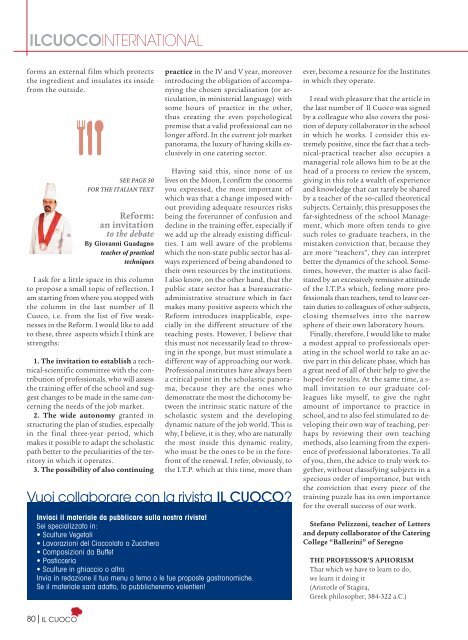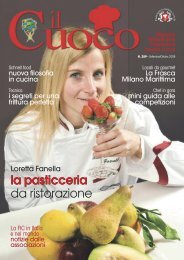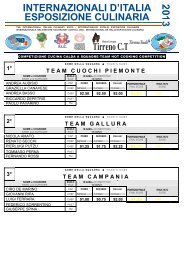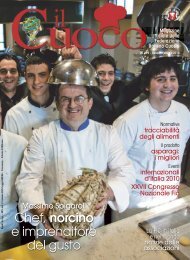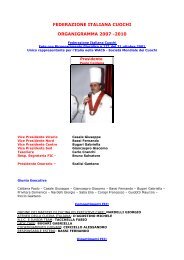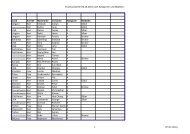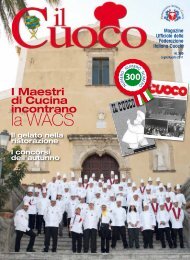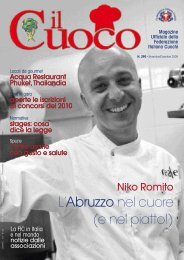Scarica versione PDF - Federazione Italiana Cuochi
Scarica versione PDF - Federazione Italiana Cuochi
Scarica versione PDF - Federazione Italiana Cuochi
You also want an ePaper? Increase the reach of your titles
YUMPU automatically turns print PDFs into web optimized ePapers that Google loves.
ILCUOCOINTERNATIONALforms an external film which protectsthe ingredient and insulates its insidefrom the outside.SEEPAGE50FOR THE ITALIAN TEXTReform:an invitationto the debateBy Giovanni Guadagnoteacher of practicaltechniquesI ask for a little space in this columnto propose a small topic of reflection. Iam starting from where you stopped withthe column in the last number of IlCuoco, i.e. from the list of five weaknessesin the Reform. I would like to addto these, three aspects which I think arestrengths:1. The invitation to establish atechnical-scientificcommittee with the contributionof professionals, who will assessthe training offer of the school and suggestchangestobemadeinthesameconcerningthe needs of the job market.2. The wide autonomy granted instructuring the plan of studies, especiallyin the final three-year period, whichmakes it possible to adapt the scholasticpath better to the peculiarities of the territoryin which it operates.3. The possibility of also continuingpractice in the IV and V year, moreoverintroducing the obligation of accompanyingthe chosen specialisation (or articulation,in ministerial language) withsome hours of practice in the other,thus creating the even psychologicalpremise that a valid professional can nolonger afford. In the current job marketpanorama, the luxury of having skills exclusivelyin one catering sector.Having said this, since none of uslives on the Moon, I confirm the concernsyou expressed, the most important ofwhich was that a change imposed withoutproviding adequate resources risksbeing the forerunner of confusion anddecline in the training offer, especially ifwe add up the already existing difficulties.I am well aware of the problemswhich the non-state public sector has alwaysexperienced of being abandoned totheir own resources by the institutions.I also know, on the other hand, that thepublic state sector has a bureaucraticadministrativestructure which in factmakes many positive aspects which theReform introduces inapplicable, especiallyin the different structure of theteaching posts. However, I believe thatthis must not necessarily lead to throwingin the sponge, but must stimulate adifferent way of approaching our work.Professional institutes have always beena critical point in the scholastic panorama,because they are the ones whodemonstrate the most the dichotomy betweenthe intrinsic static nature of thescholastic system and the developingdynamic nature of the job world. This iswhy,Ibelieve,itisthey,whoarenaturallythe most inside this dynamic reality,who must be the ones to be in the forefrontof the renewal. I refer, obviously, tothe I.T.P. which at this time, more thanVuoi collaborare con la rivista IL CUOCO?Inviaci il materiale da pubblicare sulla nostra rivista!Sei specializzato in:• Sculture Vegetali• Lavorazioni del Cioccolato o Zucchero• Composizioni da Buffet• Pasticceria• Sculture in ghiaccio o altroInvia in redazione il tuo menu a tema o le tue proposte gastronomiche.Se il materiale sarà adatto, lo pubblicheremo volentieri!ever, become a resource for the Institutesin which they operate.I read with pleasure that the article inthe last number of Il Cuoco was signedby a colleague who also covers the positionof deputy collaborator in the schoolin which he works. I consider this extremelypositive, since the fact that a technical-practicalteacher also occupies amanagerial role allows him to be at thehead of a process to review the system,giving in this role a wealth of experienceand knowledge that can rarely be sharedby a teacher of the so-called theoreticalsubjects. Certainly, this presupposes thefar-sightedness of the school Management,which more often tends to givesuch roles to graduate teachers, in themistaken conviction that, because theyare more “teachers”, they can interpretbetter the dynamics of the school. Sometimes,however, the matter is also facilitatedby an excessively remissive attitudeof the I.T.P.s which, feeling more professionalsthan teachers, tend to leave certainduties to colleagues of other subjects,closing themselves into the narrowsphere of their own laboratory hours.Finally, therefore, I would like to makea modest appeal to professionals operatingin the school world to take an activepart in this delicate phase, which hasa great need of all of their help to give thehoped-for results. At the same time, a s-mall invitation to our graduate colleagueslike myself, to give the rightamount of importance to practice inschool, and to also feel stimulated to developingtheir own way of teaching, perhapsby reviewing their own teachingmethods, also learning from the experienceof professional laboratories. To allof you, then, the advice to truly work together,without classifying subjects in aspecious order of importance, but withthe conviction that every piece of thetraining puzzle has its own importancefor the overall success of our work.Stefano Pelizzoni, teacher of Lettersand deputy collaborator of the CateringCollege “Ballerini” of SeregnoTHE PROFESSOR’S APHORISMThat which we have to learn to do,we learn it doing it(Aristotle of Stagira,Greek philosopher, 384-322 a.C.)80|


